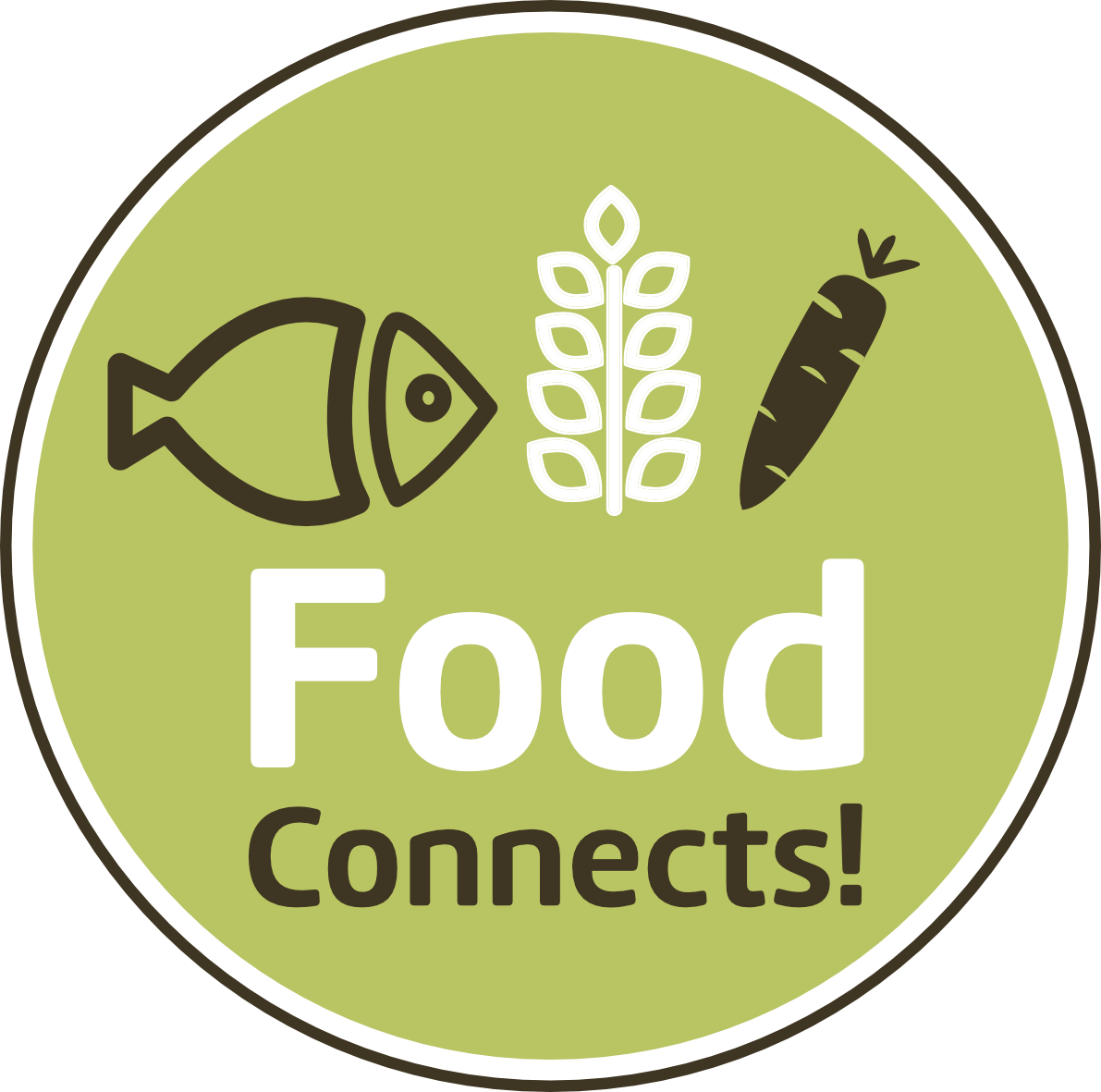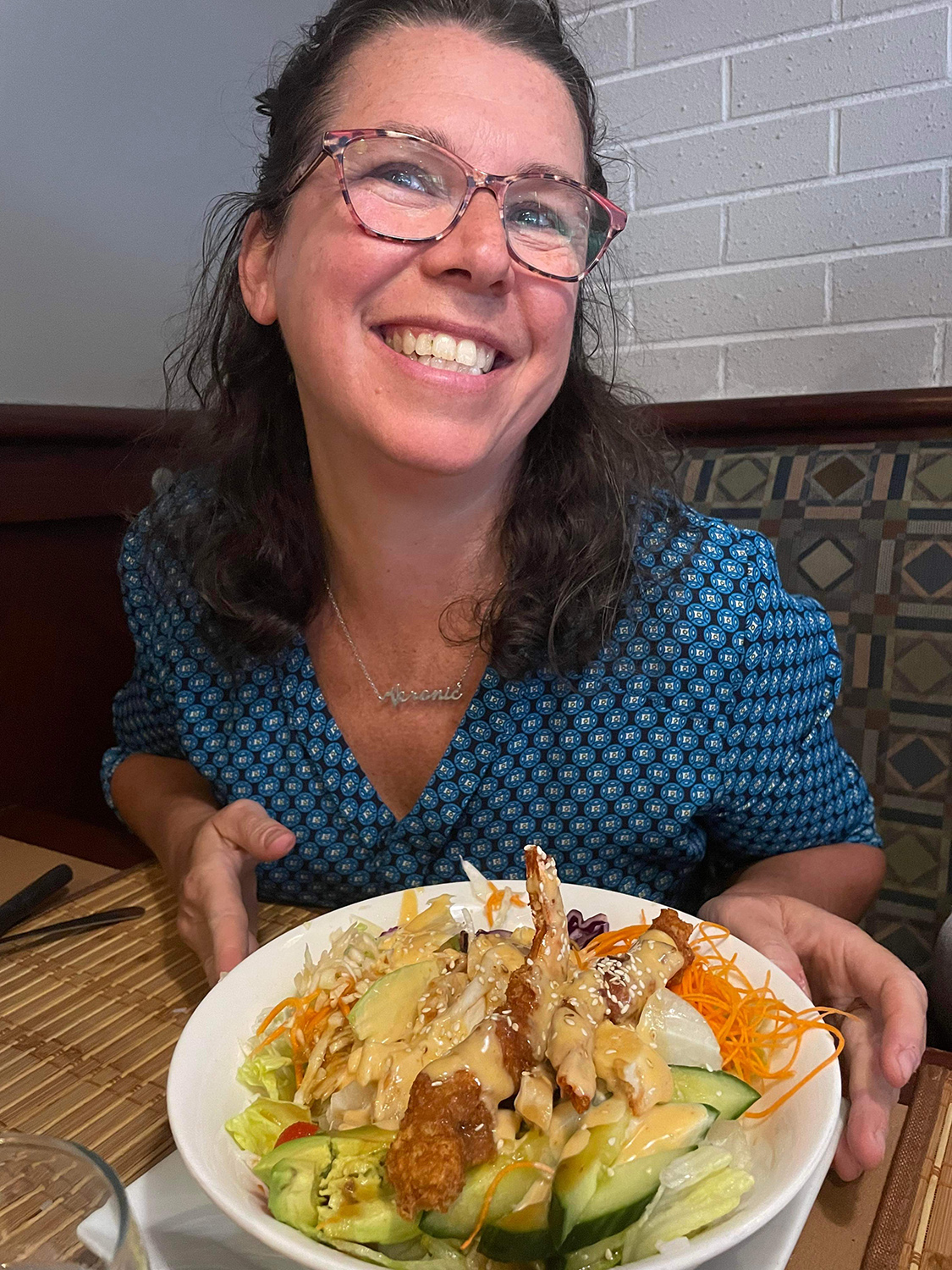

Champion: Véronic Poisson
Location: Val-des-Sources, Québec
Nominator: Clara Canac, Sustainable Food Advisory, Équiterre
Favourite way “food connects”: Curriculum
Link to F2CC: Worked on three projects supported by Farm to Cafeteria Canada grants in 2018, 2020 and 2022
Photo Credit: Véronic Poisson
She started volunteering at the local market and eventually brought her passion for local food to her school. Working with the school’s principal, Véronic helped launch a food cooperative whose mission is to source local food to feed the most students possible.
A Farm to School Salad Bar is a type of school food service that allows students to build their own bowl or plate from a choice of healthy, most often, local foods, including a variety of vegetables and fruit and at least one grain and one protein option.
The cooperative has expanded since its launch in 2017. It supplies the schools’ salad bars, offers nutrition workshops and acts like a local food bank. Of six primary schools that are part of the cooperative, two currently run salad bars. Over time, the cooperative hopes to grow the number of salad bars in other schools as well as increase the number of days the salad bars are offered.
“Eighty to eighty-five percent of the meals are made from locally sourced food including meat, eggs, vegetables, and cheese,” says Véronic. “Meals are served to students who need it most and those who can afford to, pay a reduced amount.”
In her role as teacher, Véronic grasps every opportunity to involve high school students in the many components of the food system. They work in the large garden helping with planting, maintenance of the garden as well as harvesting.
The elementary students enjoy sharing meals together they have helped prepare. “They are not afraid to taste new foods,” admits Véronic. “If the food looks attractive and colourful, they are keen to try.”
When the school first introduced salad bars with items from the garden like sprouts, watermelon radishes, and parsnips, the kids were hesitant to try them. “Today, I see students reach for vegetables and a dip instead of a chocolate chip muffin. That is so gratifying,” says Véronic.
Connecting students to healthy food and the people that produce it is easier in a community like Val-des-Sources admits Véronic. Consider that some students will know their schoolmate’s father produces the beef that contributed the BBQ meatballs, or the local farmer who provides the eggs. Those messages spread and help create a growing curiosity and interest among the students as to where their food comes from.
Véronic’s creativity and resourcefulness mean food costs for the cooperative are kept as low as possible and that students get to sample some unique dishes. In the fall, she calls local producers and takes whatever they donate from their garden. When one local farmer offered his pumpkins, Véronic then reached out to the local baker who made a pumpkin crème caramel and a crumble with a base of roasted pumpkin seeds and maple syrup—a surprise and delight to everyone.
The students also get to experience local food outside the school setting. A few years ago, the students set up their own version of a food market as part of their contribution to the province’s “Les institutions mangent local” (Institutions eat local). During lunchtime, local producers brought their products for the students to see and taste. “It created a strong sense of belonging and connection to their own community,” says Véronic.
Véronic’s vision is for children from kindergarten to university to have access to good, healthy food at a reasonable price and that they know where their food comes from, what is involved in growing the food, and an appreciation for animals involved in food production.
Inspired by Farm to Cafeteria Canada, Véronic is creating important connections between local food producers and suppliers across the Eastern Townships of Quebec and the students she interacts with. Véronic is also adept at mobilizing parents, teachers, and principals by offering them resources and ideas for concrete local food-related projects.
 While food connects us in many ways, we asked Véronic to pick one “food connects” theme that resonates with her. She chose “Curriculum”.
While food connects us in many ways, we asked Véronic to pick one “food connects” theme that resonates with her. She chose “Curriculum”.
Véronic continues to have productive conversations with the Cooperative’s partners to explore ways to add more of the curriculum devoted to food and community. In the meantime, a growing number of Quebec schools have introduced “AgrÉcoles” (AgriSchool) for grades 1 to 6. The new program works with schools to integrate agri-food into school life in innovative ways that encourage students to explore and understand their environment, adopt healthy lifestyles and, as future citizens, get involved in promoting society and the environment.
Champions like Véronic are helping Farm to Cafeteria live its mission of transforming how food is experienced, learned and celebrated by fostering a sense of belonging, purpose and inclusion for many students in schools across the Eastern Townships, and by inspiring others to become involved.
As recipients of a Farm to School Canada Grant, these schools have shown their commitment to foster vibrant school systems, but they can’t do it alone. Help us support more individuals like Veronic Poisson and school communities like Val-des-Sources to create lifelong connections between students and their food, and the systems that produce it.